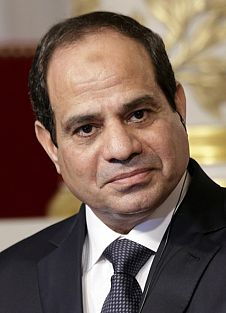Former Field Marshal Abdel Fattah Saeed El-Sisi was sworn into office as the 6th President of Egypt on 8 June 2014, having earlier that year resigned from his post as the Commander-in-Chief of the Egyptian Armed Forces. As a civilian, and as Deputy Prime Minister, Sisi won the presidential elections held in May 2014.
Birth: 19 November 1954 (Age: 71)
Source of Influence: Political
Influence: President of Egypt
School of Thought: Sunni, Traditional Sunni
Status: Featured in current year
Former Field Marshal Abdel Fattah Saeed El-Sisi was sworn into office as the 6th President of Egypt on 8 June 2014, having earlier that year resigned from his post as the Commander-in-Chief of the Egyptian Armed Forces. As a civilian, and as Deputy Prime Minister, Sisi won the presidential elections held in May 2014.
Post-Arab Spring: Former Field Marshal Abdel Fattah Saeed El-Sisi removed Egypt’s first democratically elected president (Mohamed Morsi (d. 2019)) from power in 2013 in response to street protests against the Muslim Brotherhood-led government. Outbreaks of violence ensued across Egypt that included the death of many hundreds of protesters at the hands of pro-military police at the Raba’a Al-Adawiya Square in Cairo. Sisi then ran for office himself and was sworn into office as President of Egypt on 8 June 2014.
Presidential Elections: Sisi secured a third six-year term, winning 89.6% of the vote in the December 2023 election. This victory extends Sis’s presidency until 2030, after which he is constitutionally barred from running again. He faced minimal competition from three low-profile candidates with the runner-up receiving only 4.5% of the votes. The election was marked by controversy, as leading opposition candidate Ahmed Tantawy withdrew months before the poll, citing intimidation and violence against his campaign. Key issues in the election included Egypt’s struggling economy and the ongoing conflict in Gaza.
Challenges: With inflation running at 26%, the currency devalued (1 US dollar is 48 Egyptian pounds compared to 7 pounds when Sisi first came to power) and a huge international debt, economic hardship has been felt by most of the population. Human rights organizations estimate that the number of political prisoners in Egypt ranges between 65,000 to 70,000.
Mega Projects: The country’s economic hardships have not stopped several mega projects, including the New Administrative Capital, which is in its first phase and has cost over $45 billion, a new “summer capital” on the north coast, a nuclear power plant, and a sustainable city in the Nile delta, amongst others. However, critics argue that these initiatives have depleted the country’s economic resources and led to unprecedented levels of debt, severely impacting the economy.
Gaza: The Rafah Border Crossing is the only crossing point between Egypt and the Gaza Strip and it is heavily guarded as Egypt fears mass displacement of Palestinians from Gaza into Sinai. Egypt, along with Jordan and Qatar, is mediating ceasefire talks between Israel and Hamas. The war has severely affected Egypt’s economy, reducing tourism, Suez Canal revenues, and natural gas exports, but it has received major financial support from the UAE, EU and the IMF.
“I would never stay in office against the will of the people. My ethics and patriotism do not
allow me to do so”
116 million population of Egypt
6.7 million tonnes maximum capacity of Port Said
News about Abdel Fattah El-Sisi
- No approved news items yet.



